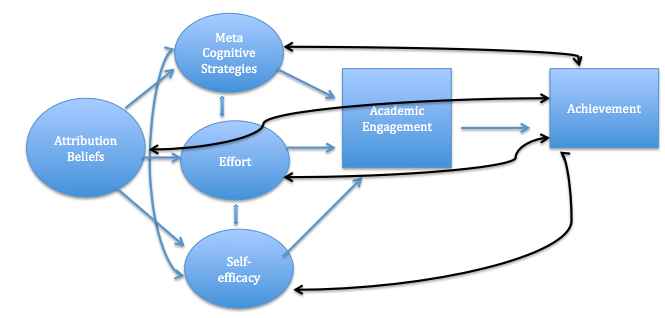Portfolio II: Analytic Personal / Professional
As I enter the sixth semester of the PhD curriculum, I reflect back to the struggles of the first two years of the program. I grappled with the constructs of self-regulation and student beliefs, research stances, theories, and perspectives in the study of education. While I still cannot claim to be a specialist in any field, I have gained the confidence to research any topic to meaningfully converse about the literature and to integrate theories (attribution, self-regulation, academic engagement, etc.) to develop a research design for the dissertation phase.
The analytical and integrated thinking section, along with the vita, program plan, and academic archives are revised per the portfolio I feedback and are evidence of how my thinking has evolved since portfolio I. As discussed in my goal statement, increasing my research skills is the focus. I want to hew as perfect a research design (figure 1) to investigate the effect of academic engagement on achievement when attribution beliefs, self-regulated learning, and self-efficacy are taken into account.
Figure 1. Design Map: Academic Engagement
As I become more comfortable with my ‘way of knowing,’ critical realism, a perspective that research is made up of observable data and non-observable data, I have found the intellectual freedom to accept that sometimes I feel like a fraud and at other times I can have flashes of insight. I attribute this to the commitment to steep myself in the ideas and thoughts of the masters by ensuring that I approach required literature reviews, document analyses, and/or article critiques assigned by my professors with a deliberate focus on my research interests (see figure 2). My intent is to use Zimmerman’s self-regulatory cyclical model to demonstrate how self-regulation enhances academic engagement for struggling students. I assert that attribution belief is the first step in learning to learn for struggling students. I will to examine this by asking “How can achievement be improved through academic engagement by focusing on enhancing self-efficacy, metacognitive strategies, and effort by revising students’ attribution beliefs?”
Figure 2. The model illustrates attribution belief as an influencer on the learning variables of meta-cognitive strategies, effort, and self-efficacy toward achievement. In addition, the model shows the mediating effect of academic engagement on achievement.


